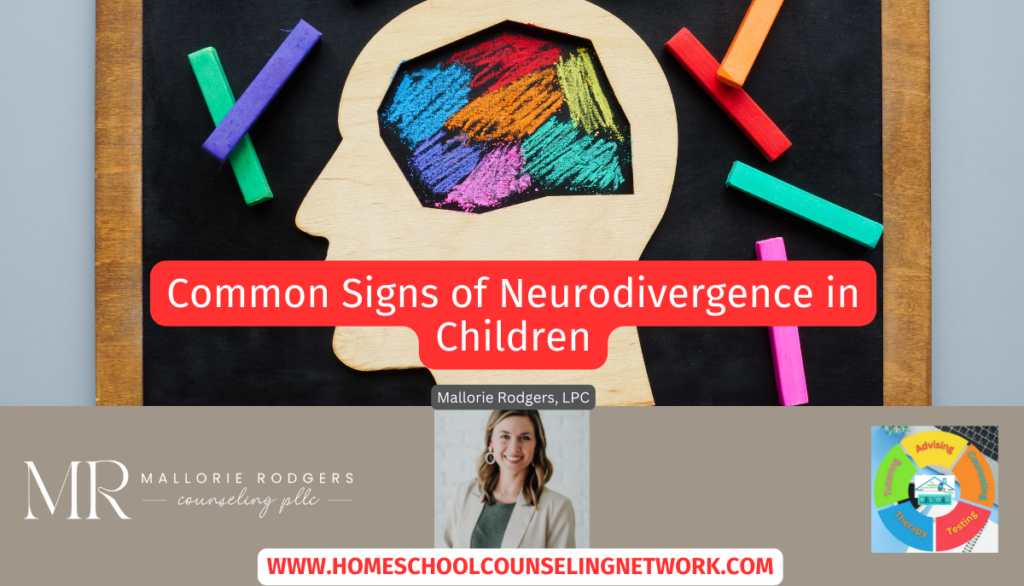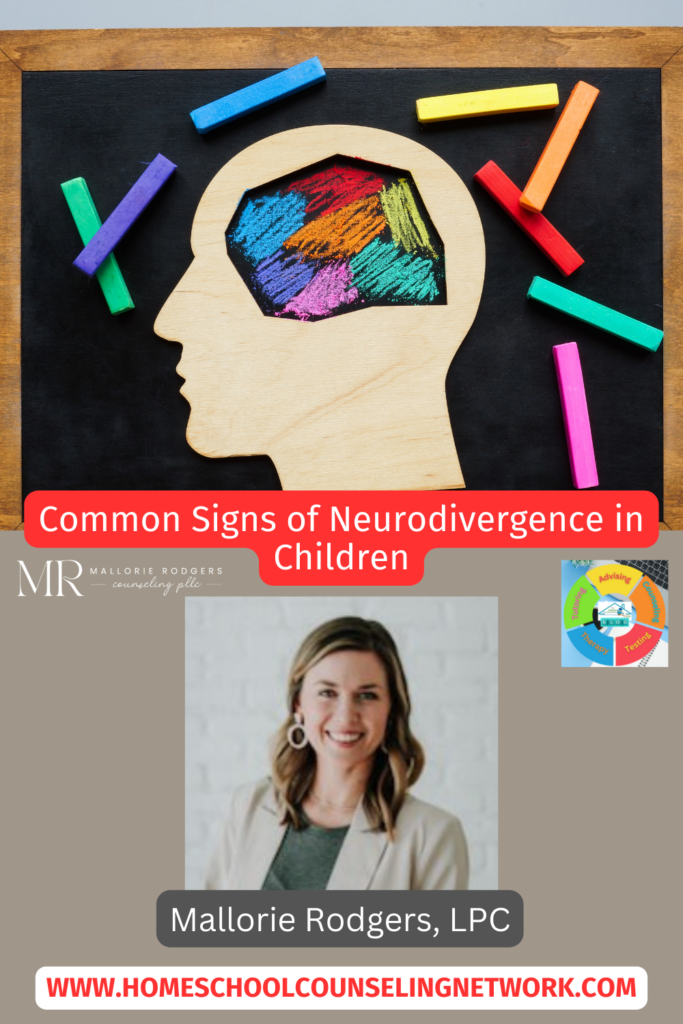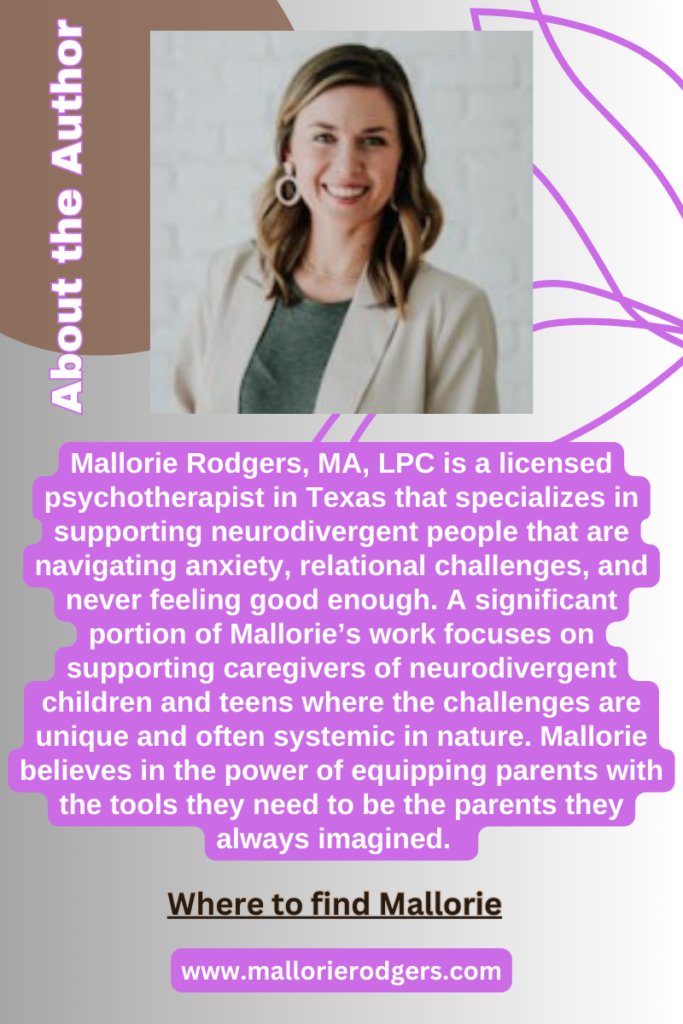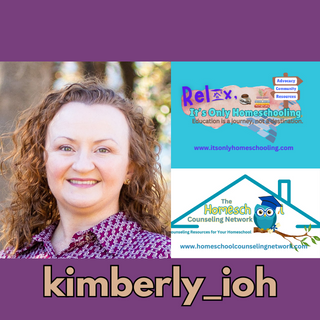HCN Guest Blogger and Licensed Psychotherapist Mallorie Rodgers Shares Some Common Signs of Neurodivergence in Children

Something Feels Different
Each family chooses to homeschool for a variety of reasons that are personal to their own family’s needs.
As a homeschooling parent or caregiver, you know your child really, really well. You spend most waking moments together and have made it your job to get to know their brain. If you are coming across some difficulty in your homeschooling journey, curiosity may begin to arise about what additional support may be needed to help your child thrive.
Some questions you may be reflecting on are: What is a reasonable expectation to have for my child? When is a behavior or challenge the sign of something larger, and when is it just something that every child has to navigate in their life and they will just outgrow it? When I see them thriving in one thing and struggling in another, how should I handle it?
The answer to these questions isn’t always a diagnosis or disability. And even when a “label” does exist, it isn’t helpful to all families or situations. But sometimes having a name for something can bring parents and kids a feeling of community and clarity. Feelings like: “Oh I’m not alone,” or the validation of “It’s not that I just need to try harder. My brain works differently and that’s okay,” can be extremely helpful.
Even if you have experience in education or child development before homeschooling your kids, every child is different. Even two children who share the same disability or diagnosis can have wildly different presentations and needs.
So if something feels different to you, tune into that feeling and read on for some guidance on what that difference may be.
What is Neurodivergence?
Neurodiversity, neurodivergent, and neurotypical – when should you use each of these terms? And why does it matter which one we use?
In the age of so much room for lived experience to shine, it is important that we come back to the meaning of important terms so we can continue doing justice to the overall neurodiversity movement. Words matter because they are one way to show people we value their experience and what matters to them.
Neurodiversity is a term coined by Judy Singer to advocate for all brains to be seen as good brains. Neurodiversity is a term to describe a paradigm or movement, not a person. Neurodivergent or neurotypical are words to define a person’s neurotype, whereas the neurodiversity paradigm is an advocacy movement.
This movement acknowledges that modern society, at least in the United States, is primarily established by and designed for neurotypical brains. Therefore, anyone aligning with neurodivergent traits or experiences may need additional support to live the life they want in a world that wasn’t designed with them in mind.
The most important thing I can stress is this: different is not bad. It can really feel that way given the challenges neurodivergent people face, but that is an opportunity for us to do what we can to support their unmet needs as they navigate life.
Neurodivergent is a term coined by Kassiane Asasumasu and refers to anyone whose brain operates in a way that is different or diverges from the norm. You’ll notice this is a broad definition, and that is on purpose.
The neurodivergent umbrella from Sonny Jane Wise is a great visual for beginning to understand all of the differences that are included in the term neurodivergence. Again, the term neurodivergent simply refers to a difference in brain operation or structure. The most popular diagnoses we are familiar with as neurodivergent are ADHD and Autism, but some other examples are Tourette’s, OCD, PTSD, learning differences, and seizure disorders.
Common Signs of Neurodivergence
Generally, here are some of the initial signs of neurodivergence I observe in the individuals and families I work with:
- Frequently fidgeting and moving
- Easily emotionally dysregulated – more so than others in their age bracket
- Deep empathy with people, animals, or objects
- Sensory differences
- High need for negotiating and collaborating
- Highly creative
- Struggling deeply with one topic in school while thriving in another
- Higher than average need for routine or novelty
- Ability to hyperfocus on something for long periods
- Delayed or hyperprocessing speed
- Difficulty with concepts involving numbers or letters
- Poor physical coordination
- Resistance or difficulty with activities involving handwriting
It’s important to note that just because a child has one or two of the above does not mean that they are neurodivergent, but it can be cause for further exploration and curiosity.
You’ll also notice that not all of the signs mentioned are negative. In a traditional learning environment, neurodivergent children are often noticed first for their challenges as it is a system that relies on a smooth operation to keep moving. There are also few resources to support each child’s specific interests in a traditional classroom.
While accommodations are possible in a traditional learning environment, it can be more difficult given the limitation of resources. In a homeschool environment, the challenges can oftentimes be accommodated much more easily and there is more flexibility to support the areas where a child is thriving.

Now What?
So let’s say you see some of the above signs in your child. What are you supposed to do next?
You and any co-parent (and ideally your child) get to choose.
There has been a rampant spread of normalization with ADHD and Autism over the last few years, largely due to social media. This trend is wonderful because it is helping remove the stigma and stereotype that comes with each of these disabilities. We can now see adult Autistics or ADHDers all over the internet who are in healthy relationships, have blooming careers, and can engage in society the way that works for them.
Decreased stigma means more people are seeking official diagnoses for all kinds of neurodivergence than ever before. This is amazing news because it means more people have the opportunity to be supported in the proper ways than ever before!
One downside of this trend is that some people feel pressure to fit themselves into a “diagnosis box” where there doesn’t need to be one. Even if your child may meet diagnostic criteria, you don’t always need to seek a diagnosis. It’s a personal choice for each parent and child to make together, if possible and appropriate.
Here are some reasons why seeking a diagnosis can be helpful:
- Medication could help and having a diagnosis is necessary to access it
- Clarity may bring peace of mind
- A sense of belonging. “There are others like me!”
- Can be helpful when seeking medical providers who understand your child’s unique needs and situation
- Accommodations at work or school
Since you don’t need a diagnosis to make accommodations in a homeschool environment, many of the families that I work with are looking for the first four points.
If you feel that your child meets some of the criteria above and you would like to explore further, I encourage you to get connected with a local therapist, psychologist, or support group that is well-versed in neurodiversity-affirming care and can offer services or helpful resources that can support your homeschooling journey.
And remember, all brains are good brains!
About the Author

Want To Write For Us?
Learn more about how you can become a guest blogger for The Homeschool Counseling Network here.

Let’s Keep In Touch
Be sure you do not miss a blog post by signing up for our newsletter or joining our Facebook group.
Blessings,
Kimberly Bennett, LPC
Founder/CEO It’s Only Homeschooling
Founder/CEO The Homeschool Counseling Network

This website is not a professional counseling website and nothing here should be construed as professional counseling advice. Although Kimberly Bennett, LPC is a Licensed Professional Counselor, she is not your counselor, and no counselor-client relationship is established unless she has signed an agreement with you. All information provided through this website is for informational and educational purposes only.